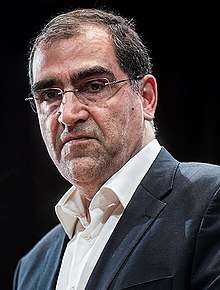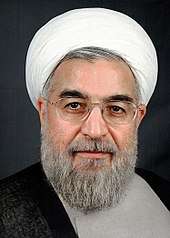Hassan Ghazizadeh Hashemi
Sayyid Hassan Ghazizadeh Hashemi (Persian: سید حسن قاضیزاده هاشمی; born 21 March 1959)[3] is an Iranian ophthalmologist and associate professor of Tehran University of Medical Sciences,[3] who served as the Minister of Health and Medical Education from 2013 to 2019 in the administration of President Hassan Rouhani.[4]
Hassan Ghazizadeh Hashemi | |
|---|---|
 Hashemi in 2017 | |
| Minister of Health and Medical Education | |
| In office 15 August 2013 – 3 January 2019 | |
| President | Hassan Rouhani |
| Preceded by | Hassan Tarighat Monfared |
| Succeeded by | Saeed Namaki |
| Personal details | |
| Born | Seyyed Hassan Ghazizadeh Hashemi March 21, 1959 Fariman, Iran |
| Nationality | Iranian |
| Political party | Independent[1] |
| Spouse(s) | Leyli Kouchakzadeh[2] |
| Children | 3 |
| Relatives | Amir-Hossein Ghazizadeh Hashemi (cousin) Ehsan Ghazizadeh Hashemi (cousin) |
| Alma mater | Mashhad University of Medical Sciences Shahid Beheshti University of Medical Sciences |
| Occupation | Associate professor |
| Profession | Ophthalmologist |
| Cabinet | Rouhani Cabinet |
| Website | Official website |
| Military service | |
| Allegiance | Iran |
| Branch/service | Jahad-e Sazandegi |
| Years of service | 1980–1984 |
| Unit | Combat engineering |
| Battles/wars | Iran-Iraq War |
He has previously served as an advisor to former minister Mohammad Farhadi from 1997 to 2001 and Chancellor of the Tehran University of Medical Sciences, School of Medicine.[4]
Ghazizadeh Hashemi is known as the designer of "Health evolution plan" (Persian: طرح تحول سلامت), also called “Rouhani-Care”,[5] a plan designed to reform Iran's Healthcare system by "granting the public fair access to healthcare, enhance equity, cover health costs and promote the quality of healthcare services that people receive".[6] He resigned on 28 December 2018 in protest to next year's medical budget. His resignation was accepted on 3 January 2019 by Rouhani.
Hashemi is also head of Noor Ophthalmology Complex, which he founded in 1993[7] and a co-founder of "Nooravaran Salamat Charity Foundation" (Persian: بنیاد خیریه نورآوران سلامت),[8] a philanthropic NGO which provides free healthcare and surgeries to people in deprived parts of Iran via mobile clinics.[9]
Education[3]
- Ant segment and Cornea Fellowship, Shahid Beheshti University of Medical Sciences (1991)
- Ophthalmology, Mashhad University of Medical Sciences (1989)
- Medical Doctorate, Mashhad University of Medical Sciences (1985)
References
- Political affiliation of Rouhani Cabinet members, Mehr News Agency
- "گفت و گوی متفاوت با وزیر بهداشت، درمان و آموزش پزشکی". Archived from the original on 2016-08-15. Retrieved 2016-07-05.
- "Faculty of medicine / Academic staff / Dr Seyed Hasan Ghazizade Hashemi / Public information". Tehran University of Medical Sciences, School of Medicine. Archived from the original on August 20, 2017. Retrieved October 22, 2014.
- "Biography of proposed minister of health, medicare and medical education". Islamic Republic News Agency. May 8, 2013. Archived from the original on October 22, 2014. Retrieved October 22, 2014.
- "The best and worst of worlds: Tehran's public hospital wards". Guardian. January 28, 2015. Retrieved March 27, 2015.
- "Health Evolution Plan in the Islamic Republic of Iran". Ministry of Health. October 14, 2014. Archived from the original on December 24, 2014. Retrieved March 27, 2015.
- "Q&A: I Came, I Saw". The Business Year International Inc. Retrieved October 27, 2014.
- "Introduction to Nooravaran Salamat Charity Foundation". Nooravaran Salamat Charity Foundation. Archived from the original on May 18, 2015. Retrieved March 27, 2015.
- High prevalence of refractive errors in a rural population: 'Nooravaran Salamat' Mobile Eye Clinic experience. Clinical and Experimental Ophthalmology (Impact Factor: 1.95). 01/2013; 41 (7). DOI: 10.1111/ceo.12071

